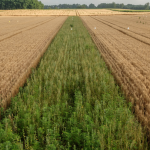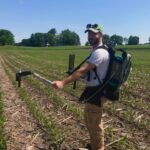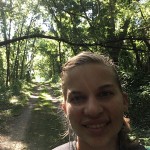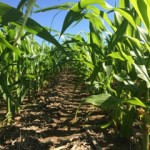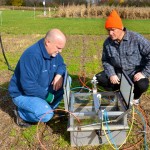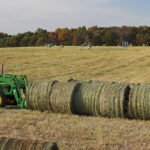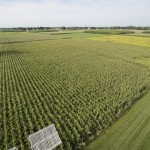New research out of MSU shows that it is possible to manage farmland to address two challenges simultaneously – protecting biodiversity and maintaining ecosystem services. The key is to strategically place native perennial vegetation within agricultural systems, using the innovative practice of prairie strips. Today, 38% of the landscape in the Midwest is planted in row crop agriculture. “We need to make this land habitable for species for the ecosystem services the increased biodiversity can provide to the farms” said Lindsey Kemmerling, the first author of the MSU-led study
Global warming impacts of intensively managed agricultural landscapes in SW Michigan: Reflections from an LTER Fellow
Graduate researcher, Pietro Sciusco, is a Ph.D. candidate in the Landscape Ecology and Ecosystem Science-LEES Lab at Michigan State University. His research interest is to estimate ecological processes and their contribution to climate change in highly managed agricultural landscapes in southwestern Michigan. This is primarily through satellite data (i.e., multi-source imaging, optical and radar) and ground measurements. There is strong scientific evidence that human activities, such as burning fossil fuels and industrial processes, are the major driver of climate change since the
From Michigan to Mexico: International collaborations to aid agriculture, climate
This piece was originally published in Michigan Farmer on Feb. 8, 2017 at http://www.michiganfarmer.com/crops/michigan-mexico-international-collaborations-aid-agriculture-climate ~~~~~ Through the help of multiple partners, a small project that started in the early 2000s at the Kellogg Biological Station Long-term Ecological Research near Hickory Corners has turned into an international effort to help Mexico reduce its greenhouse gas emissions. In the early 2000s, LTER’s Phil Robertson, a Michigan State University plant and soil professor, began researching how different rates of
Michigan was pretty cool after all: Reflections from an undergraduate researcher
KBS undergraduate summer researcher Rebekah Sanchez is a horticulture major at the University of Puerto Rico. She wrote about her Research Experience for Undergraduates project working with mentor Kate Glanville, an LTER and GLBRC graduate student in Phil Robertson's lab. Rebekah was funded by an REU site award to the Kellogg Biological Station and by an ESA SEEDS Fellowship. ~~~~~~~~~~~~ One of the cool things about going to new places or engaging in different experiences is that they rarely turn out how you imagined. Sometimes an experience exceeds your expectations and other times you
New ways to measure nitrous oxide: reflections from a KBS LTER researcher
By, Dr. Ilya Gelfand, Research Associate, Kellogg Biological Station, Michgian igelfand@msu.edu When people ask me what I do, I need to stop for a moment to answer that for myself. What do I do? I have two types of answers: short and long. The short answer isn't very short either, since ecosystem ecology requires additional explanation. First, an ecosystem is defined as a community of living organisms living and interacting within their environment. Ecosystem ecologists need to study both living and nonliving parts and their interaction, or to study biogeochemistry: interactions between
My recipe for becoming a scientist: reflections from an undergrad researcher
Each summer the KBS LTER supports students to participate in the Research Experiences for Undergraduates (REU) program, funded by the NSF. This is part of a larger undergraduate research program at KBS. Gabriela Sinclair is studying at The College of Charleston. She wrote about her REU experience working with KBS LTER PhD student Kate Glanville;in Phil Robertson's lab. ~~ My Recipe for Becoming a Scientist: Summer at KBS Timeline Application Submission: February 18th Duration: 12 weeks Arrival: May 17th Poster Presentation: July 31st Departure: August 8th Blog Post Submission: August
New tools to measure greenhouse gases
KBS LTER volunteer and retired journalist Bill Krasean reports on new tools we are using to measure greenhouse gases from agricultural lands. His piece was published today in the National LTER Newsletter and reprinted here. When the plants and microbes exhale on the 1,700-acre W. K. Kellogg Biological Station’s hundreds of plots, Sven Bohm, Kevin Kahmark and a team of fellow researchers sniff their breath. Not literally, of course. Rather, using the latest and fastest instruments and software -- much of it based on their own ingenuity -- the team continually samples and analyzes gases
Great Lakes farmers could earn credits for cutting greenhouse gas emissions
KBS LTER research was featured today in the Great Lakes Echo. "Great Lakes farmers who cut their fertilizer use could help reduce greenhouse gases. And if done through a new emissions trading program, they could get other industries to pay them to do it without harming crop yields." Read the full story here >>.
KBS LTER researchers find way for farmers to participate in carbon markets
Via MSU News, news.msu.edu EAST LANSING, Mich. — Researchers at Michigan State University have helped develop a way for farmers to participate in carbon markets and get paid to reduce their use of nitrogen fertilizer, which represents one of the largest sources of greenhouse gas emissions from agricultural production. The methodology, which was developed for the American Carbon Registry with support from the Electric Power Research Institute, will allow farmers to participate in carbon markets by creating greenhouse gas offsets by reducing the amount of nitrogen used to fertilize crops.
